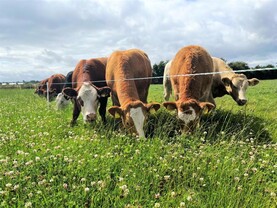As a fifth year student working towards my Leaving Certificate in 2016, I recently decided to self-study the exam subject agricultural economics. As I have begun my journey, it's evident that while agriculture is Ireland's largest indigenous industry, the Leaving Certificate subject, agricultural economics, is being deserted.
The Irish food and drink sector recorded the fifth consecutive year of growth in exports during 2014. According to Bord Bia’s latest Export Performance and Prospects report, it is estimated that the value of agri-food exports increased by 4%, reaching almost €10.5bn last year. These results are stark in comparison to the amount of students sitting the agricultural economics exam each year. Between the academic years 2000 and 2014, the subject has experienced a 76% decline in the number of pupils sitting the Leaving Certificate exam.
To my surprise, the State Examinations Commission states the syllabus for agricultural economics dates from 1969 and was examined for the first time in 1971. The number of candidates steadily increased, reaching a peak of 357 candidates in 1987. Thereafter, the numbers declined and this decline has accelerated since 2001, with 78 candidates taking the examination last year. I believe these findings are cause for concern. How is this sensible subject being disregarded while the industry itself thrives?
Information on the neglected subject is limited but as stated on Ireland's leading career guidance website, careersportal.ie, agricultural economics studies how farms operate as businesses and as part of a modern industry. The course provides a broad overview of farming in Ireland and Europe, the international trade between them, and a history of recent developments in the industry.
The Leaving Certificate examination has two components at both Higher and Ordinary Level. There is a written paper worth 80% of the total marks and a school assessed project of a “worthwhile agricultural economic nature” which is examined orally and is worth the remaining 20% of the marks.
Although I find the subject to be ideal for me or any student planning to work in agriculture or derivative production industries, it is tough to get the opportunity to study it with resources for the subject being so scarce. For example, I am yet to find a recognised agricultural economics Leaving Certificate book.
Last year the former minister for education Ruairi Quinn announced a long over-due reform of certain Leaving Certificate subjects. Even though agricultural science was included, the diminishing subject that is agricultural economics failed to appear throughout the plans. There has been no change in the syllabus or in the nature and format of the agricultural economics examination since its introduction in 1969, and with its exclusion from the announced revamp it is hard to believe this will change any time soon.
I feel as if no effort is being put into promoting the subject by any government or non-government body. There is potential within the syllabus of agricultural economics and I believe that if matters concerning resources for the subject improved, its popularity could progress and prosper alongside the very popular science subject, agricultural science.
If the public was more aware of the subject and what it entails, its demand among students could easily increase. With over 300,000 people employed directly or indirectly in the agri-food industry, there is definitely a future for agricultural economics. But first let's get the Leaving Cert subject right.
Una Sinnott is a 5th Year student in Coláiste Bhríde, Carnew, Co. Wicklow. Follow her on Twitter @UnaSinnott






 This is a subscriber-only article
This is a subscriber-only article











SHARING OPTIONS: